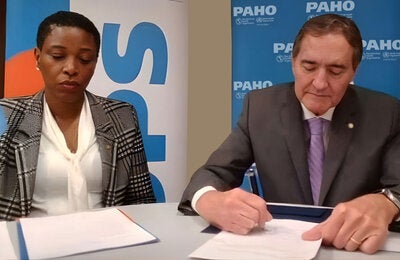Whether or not a child gets vaccinated has nothing to do with socio-economic status in Argentina. Health centres right across the country provide all children free and compulsory vaccines against 15 diseases — 16 for girls.
28 May 2013 (PAHO/WHO)-- In Argentina, the WHO-recommended human papillomavirus (HPV) vaccine is given to all girls at 11 years of age to prevent cervical cancer later in life. WHO's Regional Office for the Americas (PAHO) Revolving Fund supports the programme.
The same story plays out in a small clinic in a remote area of Argentina and in a hospital in downtown Buenos Aires: a woman waits to have her 11-year-old daughter vaccinated against the human papillomavirus (HPV).
In Argentina, whether or not a child gets vaccinated has nothing to do with socio-economic status. Health centres right across the country provide all children free and compulsory vaccines against 15 diseases. For girls there is a 16th — the WHO-recommended vaccine against HPV, which can cause cervical cancer.
"In Argentina, vaccines are a social good that makes us all equal: having an equitable programme makes it possible for all of us to have access to prevention," says the Health Minister Juan Manzur.
Argentina Ministry of Health Argentina is one of the first countries in the Region of the Americas to provide the HPV vaccine. The Pan American Health Organization (PAHO), WHO's Regional Office for the Americas, runs a Revolving Fund for the procurement of vaccines, syringes, and related supplies for participating Member States. It ensures that immunization programmes have a continuous supply of high-quality products for a low price. Argentina acquires the HPV vaccines through the PAHO Revolving Fund.
Three doses for the future
Among the newest vaccines to be offered in Argentina are the three doses against HPV, which are given to all girls at 11 years of age in order to prevent cervical cancer later in life.
HPV currently causes more than 3 000 new cases of cervical cancer and some 1800 deaths in Argentina every year, especially among the most vulnerable populations, such as those who are mobile or rural.
Cervical cancer is the second most common cancer in women worldwide. Yet, because of poor access to screening and treatment services, more than 85% of the 270 000 deaths from cervical cancer are in low- and middle-income countries.
In less than two years, since the HPV vaccine was included in Argentina's national schedule in 2011, the first dose has reached more than 80% of girls in the target age group, nearly 60% have received the second dose, and 50% have had the final third dose.
"We can take advantage of this vaccine to reduce inequity in the country's provinces. It is notable that the northern provinces have a greater cervical cancer rate, and this vaccine can help to reduce those levels," explained Pier Paolo Balladelli, PAHO/WHO Representative in Argentina.
The Argentinian authorities decided to vaccinate 11-year-olds to ensure that they are protected before they are most likely to come into contact with the virus (WHO recommends vaccination against HPV in girls 9 to 13 years old).
"Vaccinating in early adolescence means that girls who are going to become sexually active later in life are already protected by the vaccine," explained Pablo Bonvehí, President of the Argentine Society of Infectious Diseases. "Within a few years, we will see the results and the impact that this is going to have on cervical cancer in women."
Different kinds of prevention
In addition to the HPV immunization strategy, Argentina is also promoting a ground-breaking HPV self-testing project in the northern province of Jujuy. The Self-Sampling Modality Evaluation Project was implemented in 2011 with the collaboration of the provincial health ministry and WHO's International Agency for Research on Cancer (IARC).
"The objective of this research project is to evaluate the efficiency of the self-test, which could be a fundamental tool in overcoming some of the barriers women face in being able to access HPV testing. This is linked to geographical inaccessibility of the health centres, the lack of human resources to implement the measures, and women's shyness in coming forward for this test," says Silvina Arrossi, the scientific coordinator of the national cervical cancer prevention programme.



